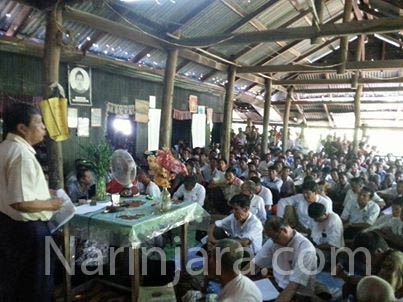Around 400 villagers from 42 villages in Kyauk Pru township gathered in a rural monastery on 7 October to raise voices in support of their rights on lands to continue, as they suspect that the proposed economic zone that coming up in their localities might render them landless.
 Ko Maung Aye, a leader of Kyauk Pru social network, said that the villagers had expressed their apprehensions about the government plan for economic zone while they assembled at Si Maw village monastery of Kyauk Pru township.
Ko Maung Aye, a leader of Kyauk Pru social network, said that the villagers had expressed their apprehensions about the government plan for economic zone while they assembled at Si Maw village monastery of Kyauk Pru township.
The government argues that it is preparing to set up an economic zone in Kyauk Pru township in order to promote various developmental activities there. The government plan is to build the economic zone in 3000 acres of lands belonged to Thit Poke Taung, Si Maw, Kran Shin and Sit Taw in Kyauk Pru township areas.
The local residents of Kyauk Pru township, which is recognized as one of the least developed areas of western Burma, welcomed the economic project but they maintained their worries that they may lose their properties due to the project in their areas.
“We are really worried about our future as we may lose our properties like the freehold lands & our precious culture due to the economic zone. So we raise our demands to the government to ensure our land rights and protect our properties,” said Ko Maung Aye.
The villagers have adopted six point agendas to deal with the issue with the government in the meeting. They argue that before going to set up the economic zone, the authority should ensure that it would not ‘accept any manufacturing if it damages the environment in the
areas’.
They also urged the government ‘to ensure all projects not to effect environmental accesses in the area, to compensate against the confiscated lands with international standard rates, to employ local residents in the economic zone as a priority, to ensure rehabilitation of cultural heritages, damaged by the economic zone, relocating in other places with the consent of local people.’
A prominent monk from the elder’s orphanage monastery declared that they would oppose the project unless the government promises to fulfill the demands of the villagers before going for the proposed economic zone in their localities.



